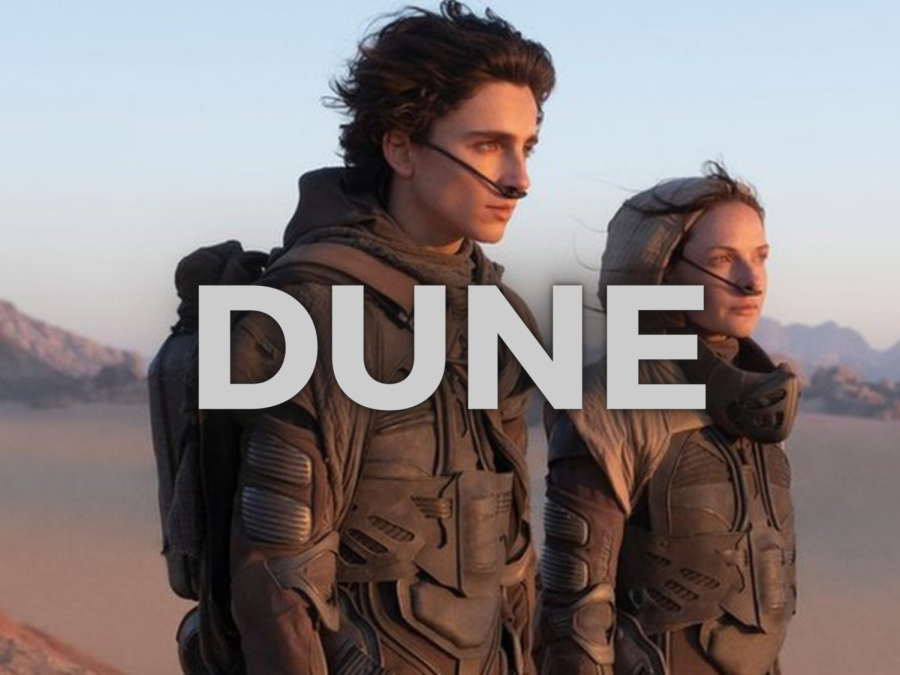Epic Sci-Fi Film ‘Dune’ Sands Down to a Lackluster Experience
Warner Brothers
After being set to premiere in late 2020, Dune held off until Friday, Oct. 22 for its debut. The film was a sci-fi action narrative highlighting the tale of Paul Atreides (Timothée Chalamet). Graphic by Amoli Agarwal. Photo courtesy of Warner Brothers.
November 17, 2021
After the blockbuster film Dune premiered on Friday, Oct. 22, I couldn’t wait to watch the beginning of a new epic sci-fi saga I knew I was sure to love. The enthralling trailers snagged my interest as soon as they popped up on my YouTube feed, promising a movie packed with action, alien worlds, interplanetary politics, and inventive plotlines. What’s more, the professionals working to bring this movie together were truly extraordinary. Denis Villeneuve, the big cheese of the title film Arrival, teamed up with Academy Award-winning composer Hans Zimmer and actors Timothée Chalamet, Zendaya, Rebecca Ferguson, Oscar Isaac, and Jason Momoa to create his masterpiece. What could go wrong?
I’m sad to say that the film was not at all up to scratch, a mediocre action film with overdramatization and yet no emotional attachment whatsoever. It felt as if I was watching two and a half hours of desert scenery on National Geographic, and not the intense chronicle suggested by the trailers. While the videography was indeed stunning, portraying the beautiful but treacherous Arrakis landscape, I was constantly waiting for the moment where I would be at the edge of my seat and completely immersed in the protagonist’s story.
The film centers around Paul Atreides (Timothée Chalamet), the son of Duke Leto (Oscar Isaac) and heir of House Atreides. Paul, Duke Leto, and his mother, Lady Jessica (Rebecca Ferguson), are sent to the planet Arrakis by the Emperor to replace House Harkonnen as its caretakers. Arrakis is home to giant, fearsome sandworms, rebellious Freman natives, and a vast supply of a valuable compound called “spice.”
The sudden overturn in power ignites the jealousy of Baron Vladimir (Stellan Skarsgard), the leader of House Harkonnen. He plots to overthrow Atreides on Arrakis and regain control of the spice supply. In the midst of this, Paul starts having dreams of a mysterious Freman woman (Zendaya) and a forthcoming crusade where he is at the helm of ruthless carnage.
While the overarching plot was straightforward enough, there were several moments of apparent randomness where an incident would transpire and never be referred to again. For example, while Paul is in his room on Arrakis, an insect-like piece of technology attempts to target and kill him. The scene is full of drums beating like a heart, a supposedly tense scene of gripping action. Yet Paul merely hides in a holograph and ends up destroying the killing device with little trouble. Afterward, there is hardly any explanation about who deployed the device and its significance for House Atreides. The suddenness of the exaggerated event and its near-immediate departure felt like a tornado had just swept by and then abruptly vanished into thin air.
One of the film’s weakest areas was its pacing. While Villeneuve skirted around many explanations to speed up the plot, I could feel the lack of dialogue every empty second, especially as the scenery stretched on and on. Any dialogue was terse and incomprehensible (most of it was whispering, really). I actually would have preferred lengthy clarifications to the overuse of wide shots for every insignificant detail. For a supposed action film, there is surprisingly little action. Villeneuve lingers on almost every battleship, building, and explosion while significantly shortening any real intensity to mere minutes.
The action the trailers display so vividly is primarily composed of Paul’s dreams. While I understand that his characteristic dreams were essential to the plot, they were repetitive and dull; there was a continuous cycle of the mysterious Freman woman gazing invitingly back at Paul in slow motion. I assume the point was introducing the Freman woman, later named Chani, as Paul’s love interest; even so, her presence was just another waste of screen time. However, Villeneuve elucidated any paramount dreams poorly and hurriedly, especially those that foreshadowed destiny; only after reading the plot online did I comprehend that Paul was visualizing the ruination of everything his family believed.
As I watched, I could feel no emotional connection to the characters or their trials. The film was much too lifeless and cold. While some scenes were supposed to be heartfelt, there was a want for authentic character development. That is not to say that nothing emotional happened, just that the delivery felt comparable to watching a soap opera starting from somewhere in the middle (melodramatic and yet wholly uninteresting simultaneously).
One of the main reasons I elected to watch this movie is because Hans Zimmer composed the music. As one of my favorite movie music composers of all time, devising the music for films like The Dark Knight, Inception, and The Lion King, Zimmer always seems to exalt his movies to another level. For instance, in Inception, Zimmer cleverly uses a simplistic eight-note theme to complement the concept of time versatility, building a sonority of orchestra and synths throughout the entire movie. In Dune, I felt Zimmer had once again brought his exceptional talent to the table, elevating every scene with his use of haunting choir segments, pounding drums, and smooth chord progressions. The music was one of the few aspects of the film I enjoyed, as it augmented the foreign Arrakis atmosphere of hair-raising sandworms, enigmatic dreams, and brutal warfare. Yet, it was not enough to compensate for the monotony.
As a viewer without prior knowledge from Frank Herbert’s book series, I thought Dune was a double-edged sword. While the action was invariably lackluster and the plot sluggishly executed, the actors and actresses played their parts well. Timothée Chalamet manifests Paul’s teenage-ridden angst and reluctance to bear a leader’s burden exquisitely. Torn between protecting her son and staying true to her order, Rebecca Ferguson brings Lady Jessica’s internal struggle to life. Even so, it was clear that Villeneuve was merely introducing the characters to set the stage for a sequel. Two and a half hours was much too long for this exposition, as it could have easily been half its screen time. This disappointing start to the new series, especially with such an incredible team of professionals, has left me uncertain whether I will return to see Dune: Part Two, Villeneuve’s anticipated continuation of the story set to debut in October 2023.





